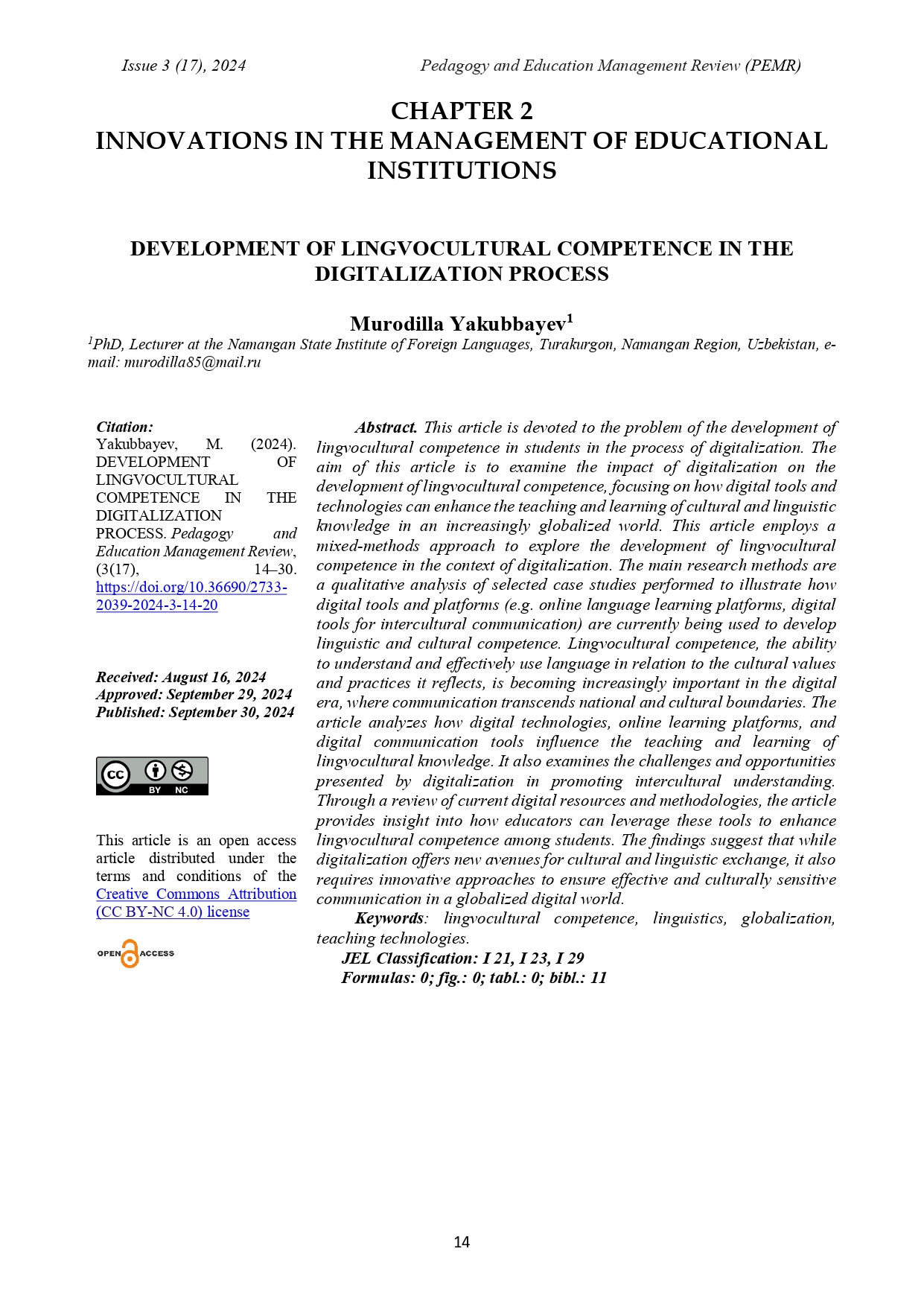DEVELOPMENT OF LINGVOCULTURAL COMPETENCE IN THE DIGITALIZATION PROCESS
DOI:
https://doi.org/10.36690/2733-2039-2024-3-14-20Keywords:
lingvocultural competence, linguistics, globalization, teaching technologiesAbstract
This article is devoted to the problem of the development of lingvocultural competence in students in the process of digitalization. The aim of this article is to examine the impact of digitalization on the development of lingvocultural competence, focusing on how digital tools and technologies can enhance the teaching and learning of cultural and linguistic knowledge in an increasingly globalized world. This article employs a mixed-methods approach to explore the development of lingvocultural competence in the context of digitalization. The main research methods are a qualitative analysis of selected case studies performed to illustrate how digital tools and platforms (e.g. online language learning platforms, digital tools for intercultural communication) are currently being used to develop linguistic and cultural competence. Lingvocultural competence, the ability to understand and effectively use language in relation to the cultural values and practices it reflects, is becoming increasingly important in the digital era, where communication transcends national and cultural boundaries. The article analyzes how digital technologies, online learning platforms, and digital communication tools influence the teaching and learning of lingvocultural knowledge. It also examines the challenges and opportunities presented by digitalization in promoting intercultural understanding. Through a review of current digital resources and methodologies, the article provides insight into how educators can leverage these tools to enhance lingvocultural competence among students. The findings suggest that while digitalization offers new avenues for cultural and linguistic exchange, it also requires innovative approaches to ensure effective and culturally sensitive communication in a globalized digital world.
Downloads
References
Воробиев.В.В., Лингвокультурология: теория и метод. М.:РУДН,1997.-С. 32.
Кешелава А.Е. Введение в «Цифровую» экономику» / А.В. Кешелава, В.Г. Буданов, В.Ю. Румянцев [и др.]; под общ. ред. А.В. Кешелава; гл. «цифр.» конс. И.А. Зимненко.– ВНИИГеосистем, 2017.– 28 с.
Маслова В.А. Лингвокультурология: Учеб. пособие для студ. высш. учеб. заведений. - М.: Издательский центр Академия, 2004. - 35 с
Hofstede G. Cultures and organizations. Software of the mind. – L.McGraw – Hill Book Company, 1991.
Mannopov J., Xolmatova A. Kasb taʼlimi oʻqituvchisining mustaqil pedagogik faoliyat yurita olish kompetentligini shakllantirish // Uzluksiz taʼlim tizimida oʻqituvchilarni kasbiy-pedagogik kompetentligini rivojlantirish muammolari va istiqbollari: Resp. ilmiy-amaliy anjumani materiallari. — Toshkent: Nizomiy nomidagi TDPU, 2013. — 209 b.
McLuhan M. Understanding Media: The Extensions of Man – Cambridge; London: MIT Press, 1994.
Oʻzbekiston milliy ensiklopediyasi. 4-jild. Zebunniso-Konigil. — Toshkent: Oʻzbekiston milliy ensiklopedyasi, 2002. — 704 b.
Oʻzbekiston Respublikasi Xalq taʼlimi tizimini 2030-yilgacha rivojlantirish konsepsiyasini tasdiqlash toʻgʻrisida. Oʻzbekiston Respublikasi Prezidentining PF-5712-son Farmoni. 2019-yil 29-aprel.
Pedagogikadan atamalar lugʻati. — Toshkent: Fan, 2008. — 196 b.
Stamp Mark. Information security: principles and practice. USA, 2011. – 240 p.
Stavroulakis Peter, Stamp Mark. Handbook of Information and Communication Security. – 2010. – 178 p.







